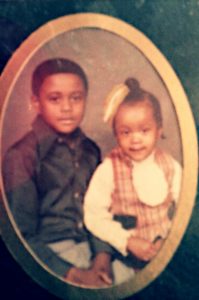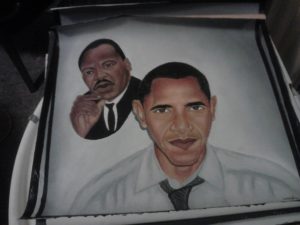
Tyrone West was an introverted artist. He was a father, a loving brother and a devoted son. And on July 18, 2013, at the age of 44, he was beaten to death by 12 to 15 Baltimore police officers.
His younger sister, Tawanda Jones, and his aunt who helped raise him, Diane Butler, have been peacefully fighting for justice for him for more than 600 days.
Tyrone and Tawanda were incredibly close despite their six-year age difference. The two have a younger sibling as well, but they remained the closest. “He’s always been very close to me. He always called me. I saw him every day,” Tawanda remembers.
Tyrone and Tawanda’s aunt, Diane, acted as a second mother to the family, and she then fully took on the maternal role once her sister passed away. She remembers Tyrone as the leader in their family. “He was the first grandchild, first nephew, just the love of my life,” Aunt Diane said, sighing.
Tyrone began to draw at the age of 9. As a child he mostly drew cartoons, but eventually he discovered his talent for drawing realistic portraits of people. He was able to capture who a person was through his pencils and paints.
“He was an inspired artist. He was going to get signed. He was good at doing real people. So many people wanted him to paint them. We were trying to get him a studio before he passed,” Tawanda explains. She had suggested that Tyrone become a forensic artist because of how realistic his portraits were, and that was something that he would have pursued.
In addition to art, Aunt Diane, who does not like to talk about Tyrone’s past, does talk about what a hardworking athlete Tyrone was. “His love was for football. He played football in school, and everybody loved him,” Diane says.
The family, from Northeast Baltimore, never thought that the police were inherently bad, and still do not believe all police officers to be racist and corrupt. However, before Tyrone’s death, the family had been focusing on Trayvon Martin’s senseless murder by George Zimmerman. Tyrone and Tawanda had even discussed the tragedy and Zimmerman’s freedom at their church, which Tyrone attended weekly.
Tawanda and Tyrone were discussing those events on the days leading up to Tyrone’s own senseless murder. “My brother and I attended church together every Sunday. My pastor said, please be careful because right now it doesn’t seem that Black lives matter,” Tawanda says.
Tyrone did not live with his sister but would pick up Tawanda from her school, where she teaches pre-kindergarten, every day at 5:30 p.m. Tyrone was always out there early at 5 p.m.
“That day, we had a police officer in the class to talk about community safety, and I was excited telling my brother about this. … This was the week the Trayvon Martin verdict came out,” Tawanda says, quickly, conveying the anticipation I imagine she had felt the day of the tragedy.
She says that while Tyrone was happy to hear about the police’s outreach to her students, he was still thinking about the Trayvon Martin case. He told Tawanda, “We gotta be really careful.” The siblings then went home to get dinner, where notably, Tawanda saw her brother drink a lot of water. This is important because the police would later claim that Tyrone, a man with no prior health problems, died from dehydration and a heart problem. Tyrone and Tawanda’s last day together was spent doing the same routine they performed daily.
During dinner, Tyrone received a phone call from a friend asking to pick her up because she was stranded. Tyrone then borrowed Tawanda’s car and went to pick her up.
“He [asked] sis, are you coming with me, and I said no, just call me once you drop her off,” Tawanda explains. She regrets that she did not go with him. The two would never finish their chicken dinner together.
Siblings, especially twins, have claimed that their feelings are in synch; that when one is in pain, the other feels it. Tawanda felt Tyrone’s pain on July 18, 2013.
“At 7 p.m., I’m in my bedroom watching TV, and all of a sudden I felt excruciating pain in my neck. I had never experienced this type of pain. My children came running in the room. I said, ‘Oh my God something must be wrong with your uncle.’ I instantly called him, and when he didn’t answer, I instantly called [Aunt Diane] and said something is wrong with Tyrone,” Tawanda explains, with panic in her voice.
She then went to look for Tyrone while her body was still in horrible pain. She sent her boyfriend down to his house to look for him. Tawanda had dated a police officer for five years prior to that boyfriend and called him as well.
“I asked him are you at work. I said please go check,” Tawanda says. As she was on the phone with her former police officer boyfriend, her current boyfriend came in and confirmed her fears. He told Tawanda and Aunt Diane that the police had killed Tyrone. Tawanda had never heard her aunt scream the way she did then.
The family went to the hospital, and some went to the police district because no one contacted them. Tyrone was beaten to death after being pulled over by police for undisclosed reasons, in broad daylight, on a crowded street, and no one in his family was notified. The police claimed that they pulled Tyrone over because there were drugs in the car — but there were not. He was then beaten by between 12 and 15 police officers, one of whom sat on Tyrone, suffocating him.
The next day the police started asking questions like, ‘Did Tyrone have any medical problems?’ They took him to the morgue and labeled him a John Doe, which he was not, and he had identification on his person.
“He had never had no run-in with the police. He was driving with no priors, no warrants, just living his life. They pulled him over for no reason,” Aunt Diane cries.
The police later claimed that they had pulled him over because his seatbelt was not on. There are no consistencies in their stories. They did not know who Tyrone West was when they decided to gruesomely take his life.
Tawanda and her family have received names of the police officers involved, who began to arrive immediately in large numbers after Tyrone was pulled over. They still work as armed officers. That same police unit based in Northeast Baltimore was responsible for the brutal killing of Anthony Anderson a year prior to Tyrone’s death.
“Witnesses said they had my brother covered up like they were playing football. He started to scream for help, so more officers arrived. They blocked the witnesses off because they were recording,” Tawanda says.
Tawanda and Aunt Diane are strong, loving, Christian women, and immediately after their beloved Tyrone’s death, they got an attorney.
“We protested week after week outside of the state’s attorney office, and we got him out of office. We also protested for a death certificate for my brother,” Tawanda says. The death certificate, which they did finally receive, was a lie and does not accurately state the circumstances of Tyrone’s murder.
Tyrone West was a single father of three children and three grandchildren. He never got a chance to meet all of the grandchildren because of his untimely death. His children were 16, 19 and 20 years old at the time of his death. Tawanda is also a mother and a teacher, and she lives in constant fear of the police on behalf of all the children in her life.
“There was a time my car was out of gas and the police came over to us. My 7-year-old girl began crying, ‘They’re going to kill us.’ … At that moment I just began crying,” Tawanda explains. Tawanda then composed herself and smiled at the officer who was helpful to the family. She wanted to use the situation as a teaching moment so that her children were not scared of all police officers.
The police have generally treated the family with respect as they have protested peacefully, and yet they have seen no justice from a system in which they have invested not only tax dollars but faith.
“All we are asking is to be treated equally. To be treated fairly. These officers come into poor Black neighborhoods. They beat our children to death. After murdering Tyrone, our tax dollars are still paying the [killer cops’] salaries,” Aunt Diane sobs.
The family has not only been speaking out for justice on behalf of Tyrone, but went to Staten Island to support the Garners when Eric Garner was killed last summer. They remain hopeful about the Black Lives Matter movement but could use the same kind of support they have given other families.
“Tyrone West was the first Ferguson, but no one came out here to help my family. We stood up, and no one came to support us. No one is going to shut my family up. We will fight for justice. We can fight this ugly fight,” Tawanda declares.
Tawanda’s love and positivity have not left the classroom despite her family’s tragedy and her heartbreak.
“It still just makes me love my class more. I let my students know that the police officers are still heroes. They look up to any adult, and those little lives matter,” Tawanda explains.
Still, Tawanda and Diane think of Tyrone constantly. A song could come on, and they’ll think of him. Diane might hear a George Jefferson joke, and she’ll think of Tyrone, to whom she refers as her son.
“Tyrone has always been the glue that holds this family together. We have not been able to enjoy one holiday. I don’t think my family will ever get out of this pain,” Aunt Diane cries as her voice trails off into just sobs.
Tawanda’s positivity and spirit are incredibly inspiring.
“If we could help another family stop from experiencing this kind of pain, we’ll do that,” Tawanda says of her commitment to the struggle for Black lives.
Tess Raser, originally from Chicago, is a teacher in Brooklyn and an active member of the growing Black Lives Matter movement. She works with various groups, including We the People and the Stop Mass Incarceration Network.



